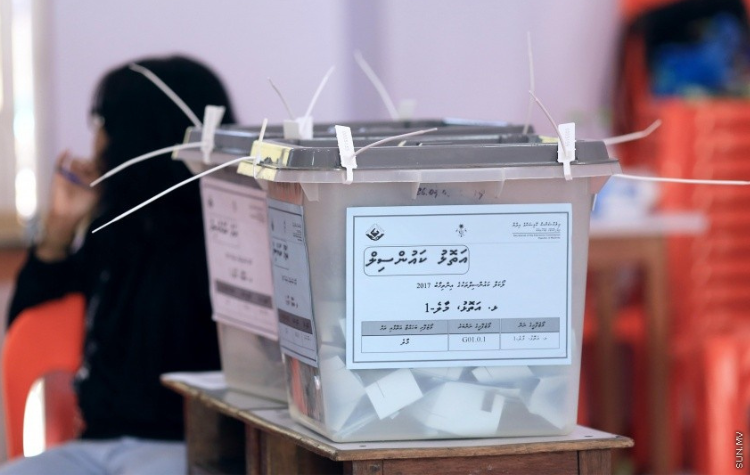As citizens of the Maldives prepare to cast their votes in presidential elections scheduled for 9 September 2023, the Asian Forum for Human Rights and Development (FORUM-ASIA) and CIVICUS: World Alliance for Citizen Participation call upon all candidates and political parties to pledge their commitment to upholding and safeguarding civic freedoms as an integral part of their electoral mandates.
Our organizations have been documenting the prevailing state of civic space in the Maldives, which is rated as ‘obstructed’ by the CIVICUS Monitor. Although the Ibrahim Solih administration, which assumed power in 2018,took steps to repeal the defamation law and establish an inquiry commission to investigate unresolved murders and disappearances, it has failed to fulfill its promises to address restrictions and threats to civic freedoms in the Maldives
The Freedom of Peaceful Assembly Act 2013 continues to impose undue limitations on assemblies, granting the police extensive discretionary powers in the issuance of permissions. The Act authorizes the police to confine demonstrations to designated areas and restrict access to journalists. Proposed amendments to this Act were rejected by parliament in November 2020.
There are also serious concerns regarding the continued reports of restrictions on protests, arbitrary arrests of protesters, and instances of excessive force and ill-treatment. In January 2023, dozens were detained following protests after the conviction of former president Abdulla Yameen Gayoom. Disturbing footage from social media captured police officers chasing a group of female protestors and subjecting an elderly woman to arrest. In May 2023, a peaceful protester demanding the removal of the Indian military’s presence in the Maldives was forcefully detained by the police, who also twisted the protester’s arm during the arrest. In June 2023, excessive force was used by the police in response to rallies by the political opposition against government corruption and mismanagement. Several people claimed that the police resorted to pepper spraying protesters, resulting in injuries, particularly affecting their eyes. On 8 August 2023, four protesters were arrested during President Solih’s campaign trip to the island of Madaveli.
Journalists have also come under attack in recent years, particularly those covering protests. In January 2023, journalist Mohamed Samah from Channel 13 was arrested and placed under house arrest for covering a protest, despite wearing a media pass. In February 2023, two journalists, Hassan Shaheed and Ahmed Misbaah, were attacked by police officers while reporting on a protest by the opposition Progressive Party of Maldives. The Police used excessive force, including pepper spray, and forcibly pushed them to the ground, despite their clear identification as journalists. In March 2023, the police assaulted and arrested Hussain Juman, a reporter for the privately-owned news website Avas, while he covered a rally by supporters of the opposition. Furthermore, a Channel 13 media worker and Sangu News journalist were physically assaulted by Maldivian police while covering an opposition protest in Malé’s Republic Square in July 2023.
The government has also failed to uphold its promise to amend the Evidence Act, which came into effect in January 2023, and enables the courts to compel journalists to disclose their confidential sources. In the latest press freedom index by Reporters Without Borders (RSF), published in May 2023, the country dropped 13 places to the 100th position.
“Under the current government, we have extensively documented arbitrary arrests and ill-treatment of protesters, especially the opposition. This pattern must come to an end, and those responsible for such violations must be held accountable. Furthermore, the Freedom of Peaceful Assembly Act must be revised to ensure it is in line with international human rights law and standards. More robust measures should be taken to protect the rights of human rights defenders, including journalists”, said Mary Aileen Diez BACALSO, Executive Director, FORUM-ASIA.
There has also been a lack of accountability for threats against civil society groups and activists, including from religious extremist groups. In October 2021, the Committee on the Elimination of Discrimination against Women expressed concern about reports of threats and intimidation against women human rights defenders, with no perpetrators held accountable. In April 2022, Aiman Latheef, a civil society activist associated with the Association for Democracy in the Maldives, received direct threats and intimidation following the filing of a Right to Information (RTI) application. More recently, in July 2023, the Family Legal Clinic( FLC),a pro bono legal service, reported receiving threats of property damage and attacks on their legal staff.
In March 2023, the Civil Court of Maldives ruled in favour of the Ministry of Youth, Sports and Community Empowerment (MoYSCE), upholding the decision to de-register a prominent human rights group, the Maldivian Democracy Network (MDN). The ruling legitimizes the arbitrary ban on MDN done in 2019 by MoYSCE, amidst a violent smear campaign targeting the organization and its staff, all in response to MDN’s 2015 report on the rise of violent extremism in the Maldives. The members of MDN were subjected to online harassment, intimidation and death threats forcing them to be relocated abroad.
“The Solih administration’s response to threats and intimidation against human rights defenders and civil society organizations in the Maldives has been inadequate. Moreover, the arbitrary deregistration of prominent human rights organization, the Maldivian Democracy Network, underscores the risks faced by civil society in undertaking their work. Any incoming administration must demonstrate a strong commitment to safeguarding fundamental freedoms and strengthening civil society”, said David Kode, Advocacy and Campaigns Lead at CIVICUS.
As a state party to the International Covenant on Civil and Political Rights (ICCPR) and a member of the UN Human Rights Council, the Maldives government has international human rights obligations to protect fundamental freedoms and to create an enabling environment for civil society.




